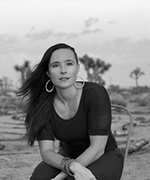By L.I. Henley
If you asked me how to get to my house,
I couldn’t tell you the names of the roads
even though I’ve traversed them since sixteen.
The names won’t stick. Or I know them but
can’t put them in order. I could hand you a bouquet
of dark roads, no streetlights but plenty of thorns:
this one is Jupiter, is Old Woman, is Baby’s Breath.
That last one isn’t a road, at least not here.
There are nights, more often than I’d like to admit,
where for several moments I think I’m lost.
Wendell Berry said, “To know the dark, go dark.”
So, I tell myself I can drive all night
in this uncertainty. At least until the tank is empty.
Then I’ll have to strip naked, enter the river.
This is where I should tell you about my fears.
What I was doing before careening slick straits
of winter road and writing this poem
in my head—teaching an adult education class
in Twentynine Palms, my classroom
down the hall from the cyber security class
where fourteen-year-olds learn to make drones,
the child development class where girls cradle
realistic babies in their bony arms.
Babies cry, drones buzz. My students are
all women with children. They come when
they can. We have to go back to the beginning
every week, go back to nouns—concrete,
countable things we can see and touch
(babies, drones). What we have in common:
we are all desert women. We have brown sunspots
and thin, tousled hair. We know what it takes
to clear a mound of tumbleweeds blocking
a gate. We know where the river is,
but we don’t go near it, for there are mouths to feed.
I don’t say anything when one woman excuses
herself while I’m talking prepositions,
comes back smelling of whiskey.
That was at eleven this morning—much too early
for under, over, beneath, the wind knocking us down,
our tree-legs righting us again.
I fear I’m a total fraud, telling women
prepositions are essential for giving
directions when no one gives
directions anymore. For telling them it’s ok
to be lost, to not know, to move ahead with feeling.
Dear Very Young Country, what will you be
when you grow up? My sweet one,
can you imagine a future?
You are beautiful when you sleep,
but you can’t sleep all day.
I drive slowly, reading all the street signs,
expecting always for a stray dog or
lean coyote to dash unknowingly across.
Find Name, Road Home
By Laura Maher
What I read as fear others read as common sense, what I read as broken others read as rusty.
Abandon can be equal parts expulsion and release, tremor and quiet.
In a desert town, a woman must know that despite her own quiet,
some part of her day has been tracked:
coyote // mountain lion // border patrol // man in store // man in car // Google // Apple
I knew this woman who came to town to restore a downtown building
for historic preservation purposes. For weeks, she scrubbed paint with a toothbrush
off of original 1930’s baked clay tiles, yellow and black.
The building, restored to beauty, scrubbed clean and shining, now sits vacant, crumbling again
but in a new way.
I wonder who will scrape the gum from the sidewalks in front of her, now that the woman has gone.
There’s something about desert towns that implies leaving or left.
How do you teach your students to conjugate verbs when they only know their embodiment?
All the roads lead back to home with Google Maps, or another equivalent.
With or without my phone, if I have taken myself somewhere once, I can find my way back.
It is an unusual skill, one I can’t explain
save a through-line to my grandmother—a woman who could find
her way through cotton field and cemetery, through classroom and chicken coop.
What did she know of fear?
And where do I begin when, if in my telling of these women,
I flatten them like a paper map?
The woman who walks by a river is said to cry for the children she drowned.
And we are taught to walk in the children’s footpath—feel the fear of the mother.
And what of the fear from the mother? Who walks in the footpath of a woman’s shame? Sadness?
Walking or driving the crunch of sand underfoot like hard edges of consonants
like enter or walk drive
want want want
In daylight, does Google find you as it does for me, name your home home?

L.I. Henley was born and raised in the Mojave Desert town of Joshua Tree, California. A mixed-media artist and writer, she is the author of six books including Starshine Road, which won the 2017 Perugia Press Prize, and the novella-in-verse, Whole Night Through. Her art, poetry, and prose have appeared in many journals, most recently Adroit, Brevity, The Indianapolis Review, Waxwing, Diode, Thrush, Ninth Letter, and Arts & Letters. Her essay, “Drive!” was chosen as the winner of the Arts & Letters/Susan Atefat Prize for Creative Nonfiction in 2020. Visit her at www.lihenley.com and follow her on Instagram @lihenleyart.

Laura Maher is the author of the chapbook, Sleep Water (Dancing Girl Press, 2017). Her poetry and prose has appeared in Quarter After Eight, The Common, Crazyhorse, The Collagist, New Ohio Review, and Third Coast. Laura holds a Bachelor of Arts from the University of Arizona, a Master of Arts from the University of Texas at Austin, and a Master of Fine Arts from Warren Wilson College. She lives, works, and writes in Tucson, Arizona. www.lauramaher.com
